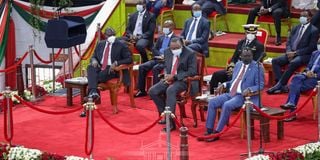Premium
BBI proposes lean wage bill, more cash for development

Deputy President William Ruto, President Uhuru Kenyatta, ODM leader Raila Odinga and other top officials at Bomas of Kenya in Nairobi for the launch of the Building Bridges Initiative (BBI) report on October 26, 2020.
What you need to know:
- The report encourages reward for effort, but discourages double payment.
- The BBI pushes for the reduction of the wage bill, which will see cuts in personal emoluments to ensure that at least 30 percent of national and county budgets are dedicated to development.
Civil servants will lose sitting allowances, ministries will be compelled to divulge the salaries for all employees and the wage bill will be slashed to fund development projects.
These are proposals contained in the Building Bridges Initiative (BBI) report submitted to President Uhuru Kenyatta and Orange Democratic Movement (ODM) party leader Raila Odinga last week. It also recommends the appointment of a team that will work with the Salaries and Remuneration Commission (SRC) to rationalise public officers’ pay.
It identifies these as administrative actions the government should implement immediately to ensure scarce public resources finance development and states that there should be a clarification of the legal and administrative powers of the SRC to ensure that it oversees all salary reviews and changes.
The report encourages reward for effort, but discourages double payment. It calls for creation of equal opportunity for career progression and enforcement of sanctions for inaction. It requires that salaries of all public servants are publicised in ministry websites.
Development expenditure
The BBI pushes for the reduction of the wage bill, which will see cuts in personal emoluments to ensure that at least 30 percent of national and county budgets are dedicated to development. The report wants the Controller of Budget and Auditor General to strictly enforce provisions of Section 15(2) of the Public Finance Management Act.
It states: “In managing the national government’s public finances, the National Treasury shall enforce the following fiscal responsibility principles— (a) over the medium term, a minimum of 30 percent of the national and county governments’ budget shall be allocated to the development expenditure.”
The report also cites Regulation 25(1) of the Public Finance Management (County Governments) Regulations, 2015 which states “...the County Executive Committee Member with the approval of the County Assembly shall set a limit on the county government's expenditure on wages and benefits for its public officers pursuant to section 107(2) of the Act.”
The limit shall not exceed 35 percent of county revenue. This excludes revenues that accrue from extractive natural resources including oil and coal. The law also provides that the county’s public debt shall never exceed 20 percent of total revenue at any one time.
Personnel emoluments
Additionally, it stipulates that the approved expenditure of a county assembly shall not exceed seven per cent of total revenue or twice the personnel emoluments of that county assembly, whichever is lower. The report stipulates that development projects should be undertaken in every county.
To ensure that citizens have access to quality services, the report recommends that a Kubadili Plan be instituted to bring marginalised wards to the level generally enjoyed by the rest of the country. In the plan, with a three-year outlook period, the wards that are most marginalised — at present and historically — are identified.
Implementation should start with the wards ranked last to build schools, health facilities, roads, water, electricity and police stations.
The report tasks the presidency and the Commission on Revenue Allocation (CRA) to ensure full implementation of this, with the CRA doing the needs analysis and the presidency implementing it.





